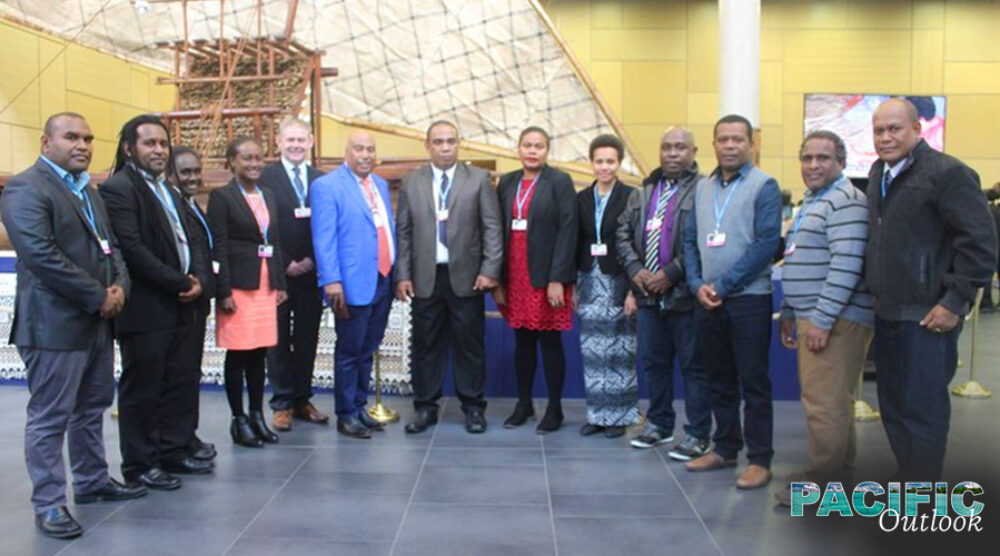Pacific Islands Forum (PIF) Leaders have reaffirmed climate change as the single greatest threat facing the Pacific. With the recurring onslaught of climate-exacerbated disasters, and the impact of COVID-19 on national economies, the Pacific is prioritising actions to leverage international climate finance to ‘build back better’ towards a more healthy and resilient future.
At the global level, the upcoming 26th session of the Conference of the Parties (COP26) to the United Nations Framework Convention on Climate Change (UNFCCC), scheduled for November 2021 in Glasgow, is an ideal opportunity for Pacific Island Countries (PICs) to advance their advocacy for strong climate finance outcomes. To have a better chance, the region’s collective diplomacy must start now and continue in the lead up to COP26.
One unique aspect of the Pacific’s preparation towards COP26 is the proactive outreach by the United Kingdom (incoming COP26 President). A UK-led high-level meeting for Pacific Leaders is planned for mid-2021. The UK’s approach has been welcomed and there is commitment by Forum Foreign Ministers in 2020 to work closely with the UK to achieve a legacy outcome at COP26. Climate finance is one of UK’s five high-level themes for COP26. The Pacific has also forged a strong alliance and support for the UN Secretary-General’s global climate advocacy efforts, including hosting him for a PIF Leaders’ dialogue in Suva in May 2019.
At COP26, the Pacific will demand the delivery of the USD 100 billion per year by 2020 commitment by developed countries, financing for loss and damage, concluding the negotiations on the Board composition of the Adaptation Fund, and negotiations on a new climate finance quantitative goal post-2020 (long-term finance). These are linked to the calls of the Kainaki II Declaration for Urgent Climate Change Action Now, issued by Forum Leaders in 2019.
With the US back in the Paris Agreement, and the much-awaited Climate Summit that President Biden will convene on 22 – 23 April, where Australia, New Zealand and the Republic of the Marshall Islands have been invited to participate, there is hope that the U.S and major economic powers will announce stronger climate actions, including contribution to the Green Climate Fund (GCF) – a key funding mechanism for the Pacific with fourteen approved projects for twelve Pacific island countries within the past five years.
While developing countries have been successful in securing global support for a 50:50 allocation of GCF resources between adaptation and mitigation, as well as the GCF Simplified Approval Process (SAP); generally the access procedures to global climate funds still remain cumbersome for capacity-constrained countries such as those in the Pacific, and much of the global climate finance investment is focused on mitigation. With COVID-19 impacts on donor economies, there is a risk that developed countries will adopt inward looking policies that make it difficult to fulfil their existing climate finance commitments and balanced allocation for adaptation activities in vulnerable developing countries. Pacific island countries look towards COP26 as an opportunity to provide further guidance to global climate funds such as the Green Climate Fund, Adaptation Fund and Global Environment Facility.
On climate finance issues, the Pacific will need to build a strong alliance with other Small Island Developing States (SIDS) through the Alliance of Small Island States (AOSIS), the Organisation of African, Caribbean and Pacific States (OACPS), and more aligned developed countries such as member states of the European Union.
Regionally, political diplomacy on climate finance has been driven through the Forum Economic Ministers Meeting (FEMM) agenda. Climate finance is a standing agenda item for the Finance Ministers of the Pacific. Through the FEMM process, an Informal Technical Working Group on Climate Finance and Public Finance Management was established and involves key regional organisations, multilateral development banks, development partners and donors. The intent is to influence global discussions and provide coordinated support to PICs to strengthen their public finance management (PFM) systems and build institutional capacity to access and manage climate finance. So far, the working group has piloted a new Public Expenditure and Financial Accountability (PEFA) Climate Module in Samoa to evaluate the responsiveness of Samoa’s PFM system to climate change, developing a regional Guideline for direct access to the Green Climate Fund, and working on an Issues Paper on the Effectiveness of Climate Finance in the Pacific.
PICs also recognise that they cannot always depend on external support. PICs have innovative regional solutions and have committed to be self-reliant but require capital to make them a reality. Over the last two years, the Pacific has been working hard to establish the Pacific Resilience Facility, a unique forward-looking Pacific owned and led initiative aimed at mobilising up to USD 1.5 billion to allow the region to invest in upfront low-quantum and high impact community-level resilience building projects. A global pledging conference is planned for the second half of 2021.
At the national level, the focus over the past decade was predominantly on ‘accessibility’ to global climate funds and the main driver has been the Ministry of Environment or Climate Change in each country. PICs now recognise the importance of ensuring the ‘effectiveness’ of climate investments and placing climate finance at the centre of development planning. The roles of central government agencies and robust public finance management systems are critical.
As we look towards COP26, these are the range of national and regional initiatives that Pacific Island Countries will be showcasing in Glasgow and they will draw on climate diplomacy to enhance their national positions through engaging new allies and partners to leverage international support.
Exsley Taloiburi is the Climate Change Finance Adviser and Resilience Team Leader, Pacific Islands Forum Secretariat. This article has been written for the Road to COP26 series for the Climate Action Beacon.








